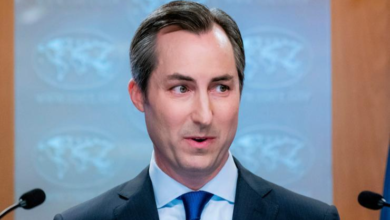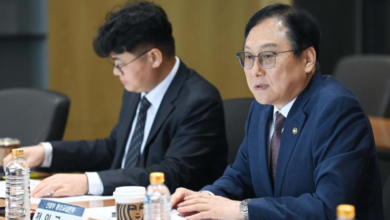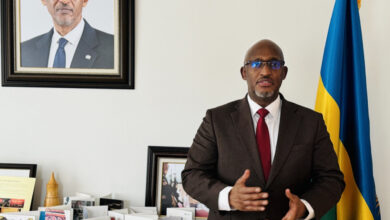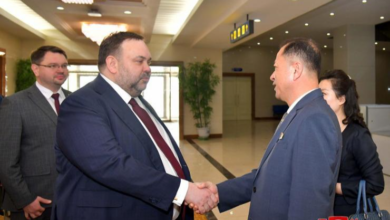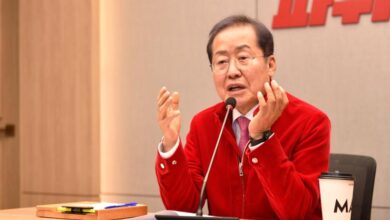Election outcome to reshape Korean politics

An official at the National Election Commission holds a voting stamp at a polling station in Yeongdeungpo District, Seoul, Tuesday, a day before the country casts ballots to elect lawmakers of the 22nd National Assembly. Yonhap
Voters will cast ballots to elect 300 lawmakers Wednesday, to determine the fate of Korea’s politics for the next four years, by either giving the ruling bloc a much-needed boost for its pledges and goals or sending a resounding message of disapproval regarding its performance and policies.
The main political theme of the general elections is whether the public will harshly judge the main parties here. The main opposition Democratic Party of Korea (DPK) is calling on the nation to “hand down judgment on the Yoon Suk Yeol administration,” while the ruling People Power Party (PPP) is urging voters to “punish DPK Chairman Lee Jae-myung and his party, which has been controlling the National Assembly” with its majority status over the past four years.
Analysts and politicians are saying whatever the outcome may be, an upheaval will be unavoidable in the country’s political landscape, affecting Yoon’s grip on state affairs and the subsequent power struggles within both the DPK and the PPP.
From 6 a.m. to 6 p.m., voters will be able to cast their ballots at 14,259 polling stations across the country to elect 254 constituency and 46 proportional representation lawmakers who will form the 22nd National Assembly for the next four years. Of the 44.28 million eligible voters, 13.85 million, or 31.28 percent, already cast their ballots during early voting — from Friday to Saturday.

Main opposition Democratic Party of Korea (DPK) Chairman Lee Jae-myung, center, reads a statement during his appearance at the Seoul Central District Court in Seocho District, Seoul, to attend a hearing on his corruption allegations. Korea Times photo by Shim Hyun-chul
The key point of Wednesday’s elections will be which side will secure more than half of the 300 seats.
Since the elections are widely viewed as a midterm evaluation of Yoon, who started his five-year term in May 2022, a DPK majority result would be interpreted as the public demonstrating its frustration toward the administration, resulting in Yoon losing a grip on state affairs with more than half of his term left.
For the past two years, Yoon has faced stumbling blocks in exercising his political power, as the DPK, which has held more than 150 Assembly seats, has been opposing many of the president’s policies and Cabinet appointments.
This tendency will be even more pronounced if the DPK maintains its majority. And it will likely make the PPP pay less attention to Yoon and instead, strive to reform the party, while facing serious internal power struggles over who will be its next presidential candidate.
“In case the DPK holds the majority, Yoon will likely face limits in most of his political capabilities, thereby falling into a lame duck status,” said Cho Jin-man, a politics professor at Duksung Women’s University.
“Turmoil in the PPP will be inevitable. It will have to reassess its relations with the Yoon administration and put emphasis on future power.”
During his speech on Tuesday, DPK Chairman Lee Jae-myung urged voters to cast their ballots “to prevent the political forces that betrayed the public from holding a majority in the Assembly.”
“The Yoon administration downgraded every aspect of the country’s economy, public livelihood, diplomacy, security and democracy,” Lee said. “Please prove that no administration can exist by defying the public, and no power can defeat the people.”

People Power Party interim leader Han Dong-hoon speaks while canvassing in Seongdong District, Seoul, Tuesday. Korea Times photo by Choi Won-suk
If the ruling party clinches the majority, the situation will be the opposite.
Yoon will be able to gain momentum in pursuing his policies, such as his three major reform proposals: labor, pension and education, which have been on hold due to the DPK’s opposition.
Also, he will not need to rely on his veto power to resist bills unilaterally, which were often pushed by the main opposition, having done so nine times so far. The DPK’s threat to launch a special counsel probe on Yoon’s wife, Kim Keon Hee, over stock price manipulation allegations, could also lose strength.
The ongoing standoff between the government and doctors over the government’s push to expand the admissions quota of medical schools will likely go in Yoon’s favor, as the election results can then be seen as a public mandate for the president to persue his aims moving forward.
If the vote is in the PPP’s favor, the DPK will face the impact of defeat.
During the candidate nomination process earlier this year, the DPK suffered serious factional infighting over what critics referred to as its chairman’s “excessive control” over the party. Lee’s leadership will likely be challenged by non-mainstream factions, resulting in chaos over finding who was responsible for the defeat and who should be the next leader.
“If the ruling party wins, the DPK will face criticism for losing the election despite the administration’s poor performance,” Cho said. “In doing so, various factions, which have already experienced infighting recently, will clamor for power … Overall, whoever loses the election will face an upheaval in their political landscape.”
PPP interim leader Han Dong-hoon told voters that casting their ballots for the ruling party is like saving the country from collapse.
“Will you let people like the DPK chairman amend the Constitution and exonerate himself from allegations he faces?” he said. “If we lose this opportunity, the only thing we can do is to hit the streets to protest.”
Read the full article here



